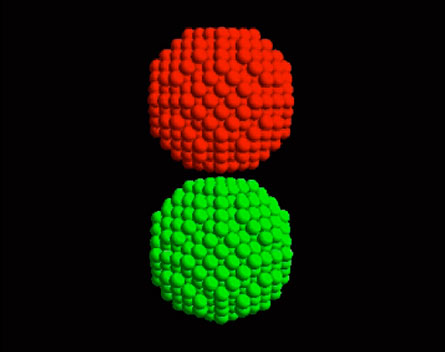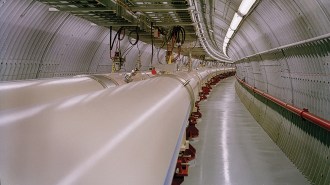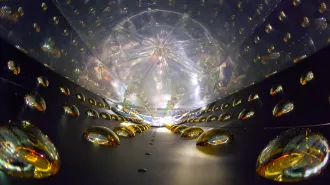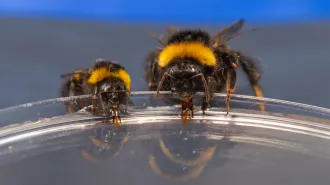Nobody’s above the law. But tiny clusters of colliding atoms may duck below the second law of thermodynamics. In simulations, researchers in Japan found that in rare cases, tiny clusters of atoms ricochet off each other faster than their approaching speeds. The results, which appeared in the March Physical Review E, seem to violate the second law’s requirement that any work squanders a little bit of energy in the form of waste heat, leaving the system a little more disheveled, with higher entropy.

In collisions big enough to see, like those between a tennis ball and a gym floor, the speed of an object’s approach is always faster than its speed after impact. A tennis ball dropped against the floor bounces a little slower and comes up shorter on each bounce because a small amount of the ball’s energy is siphoned off in the form of waste heat.
In the nanoworld, though, the new results suggest that normal rules do not always apply.
Researchers Hisao Hayakawa, of Kyoto University, and Hiroto Kuninaka, of Chuo University in Tokyo, developed a computer program to model head-on collisions of squishy clusters of several hundred atoms called nanoclusters. At speeds between 3 and 5 meters per second (less than 12 miles per hour), most of the clusters in the simulation stuck together like two candied apples in the sun. Others just bumped into each other and moved away at a slower rate than their approach, like two colliding bocce balls on a lawn.
But about 5 percent of the time, the colliding nanoclusters actually sped up after bumping, exhibiting what the researchers call a super rebound. During these rebounds, the outgoing energy exceeds the incoming energy, meaning that in these collisions, the system overall lost entropy, hence the apparent second law violation.
“It’s an interesting observation. For me, it was also counterintuitive,” comments Jörn Dunkel, a theoretical physicist at the University of Oxford in England.
This super bounce comes from the random internal fluctuations of motions in the atoms that make up each nanocluster, the study researchers say. Depending on the exact motions, some fluctuations can give the collision an extra boost, like an extra springy trampoline.
But this extra boost only works in tiny systems, not trampolines, which are made up of zillions of atoms. “Nanoscale physics involves such unexpected events,” says Hayakawa.
When the researchers increased the size of each nanocluster in the simulation to over 1,000 atoms, the super bounce disappeared entirely. “In order to see a violation of the second law, you need a very small number,” says Dunkel.
These clusters get around the second law of thermodynamics on a statistical technicality: The average speed of all the outgoing nanoclusters is less than the approaching speed. Even though individual nanoclusters appear to violate the second law occasionally, the average behavior of all the nanoclusters falls squarely in line with the law’s constraints.
The second law statistically describes large collections of atoms, like those in a tennis ball. Tiny groups of atoms, which are susceptible to large energy fluctuations, live outside of the second law. Just as a person can’t break a law that isn’t on the books, individual nanoclusters can’t really violate the second law in a meaningful way.
Furthermore, Dunkel points out, the simulation is conducted in a perfect world. The real world, however, is messy, with things like oddly-shaped objects, variable temperature, and worst of all, gravity. These confounding imperfections make a real experiment tough.
“It’s difficult to experimentally realize the conditions,” says Dunkel. “I wouldn’t say it’s unrealizable, just demanding.” To precisely control the temperature, shape and initial speed of the nanoclusters will be a challenge.
But Hayakawa thinks that experimentalists will see this effect soon. “I believe that it will not take a long time to report the super rebound of nanoclusters in experiments,” he says.
And once researchers have observed the super rebound, Hayakawa and Kuninaka plan to test whether it is possible to extract the surplus energy from these rebounds. To do so, a macroscopic machine will be needed to convert the surplus energy from the microscale super rebounds. But such a task will be difficult, since this conversion will eat up all the energy gained in the first place, says Hayakawa.







